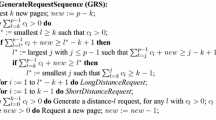Abstract.
In the paging problem we have to manage a two-level memory system, in which the first level has short access time but can hold only up to k pages, while the second level is very large but slow. We use competitive analysis to study the relative performance of the two best known algorithms for paging, LRU and FIFO. Sleator and Tarjan proved that the competitive ratio of LRU and FIFO is k . In practice, however, LRU is known to perform much better than FIFO. It is believed that the superiority of LRU can be attributed to locality of reference exhibited in request sequences. In order to study this phenomenon, Borodin et al. [2] refined the competitive approach by introducing the concept of access graphs. They conjectured that the competitive ratio of LRU on each access graph is less than or equal to the competitive ratio of FIFO. We prove this conjecture in this paper.
Similar content being viewed by others
Author information
Authors and Affiliations
Additional information
Received June 2, 1997; revised January 28, 1998.
Rights and permissions
About this article
Cite this article
Chrobak, M., Noga, J. LRU Is Better than FIFO . Algorithmica 23, 180–185 (1999). https://doi.org/10.1007/PL00009255
Issue Date:
DOI: https://doi.org/10.1007/PL00009255




